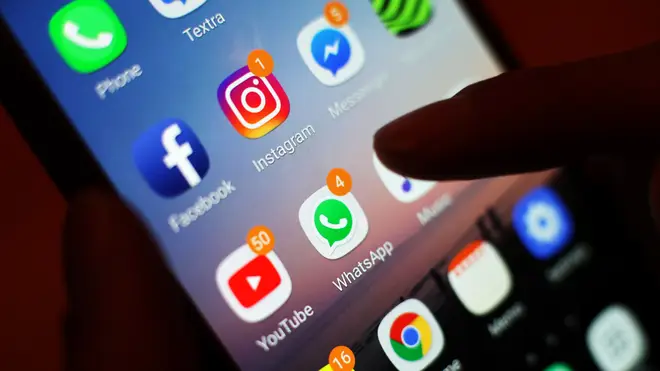
Iain Dale 7pm - 10pm
11 October 2020, 00:04

Law enforcement agencies fear a move towards end-to-end encryption will have a devastating impact on their ability to protect children online.
Facebook was responsible for 94% of the 69 million child sex abuse images reported by American technology companies last year.
The figures emerged as seven countries, including the UK, published a statement on Sunday warning of the impact of end-to-end encryption on public safety online.
Facebook has previously announced plans to fully encrypt communications in its Messenger app, as well as its Instagram Direct service – on top of WhatsApp, which is already encrypted – meaning no-one apart from the sender and recipient can read or modify messages.
The social network said the changes are designed to improve user privacy on all of its platforms.
But law enforcement agencies fear the move will have a devastating impact on their ability to target paedophiles and protect children online.
Last year, some 16.9 million referrals were made by US tech firms to the National Centre for Missing and Exploited Children (NCMEC), including 69 million images of children being abused – up 50% on the previous year.
Some 94% of the reports, which include the worst category of images, came from Facebook, Home Office officials said.
But the National Crime Agency (NCA) has warned the number could drop to zero if Facebook presses ahead with end-to-end encryption.
Robert Jones, the NCA director responsible for tackling child sexual abuse, said of the plan: “The lights go out, the door gets slammed, and we lose all of that insight. It is as simple as that.
“And nothing, you know we’re relying on the best technical expertise… in the UK, the same people that keep the UK safe against terrorists, hostile states, cyber-attacks, are telling us there is no viable alternative. I believe them. And I am deeply concerned.”
The NCA believes there are at least 300,000 people in the UK who pose a sexual threat to children, with 86,832 UK-related referrals to NCMEC last year, including 52% from Facebook and 11% from Instagram.
Mr Jones said industry reporting led to the arrest of more than 4,500 offenders and the safeguarding of around 6,000 children in the UK in the year to June 2020.
Have you started the conversation about online safety with your child? @CEOPUK 's Jessie & Friends animation series helps to teach children how to stay safe online while gaming, watching videos and sharing pictures: https://t.co/URF6a5WFaF pic.twitter.com/IgYlPcQaCd
— National Crime Agency (NCA) (@NCA_UK) September 13, 2020
“The end-to-end encryption model that’s being proposed takes out of the game one of the most successful ways for us to identify leads, and that layers on more complexity to our investigations, our digital media, our digital forensics, our profiling of individuals and our live intelligence leads, which allow us to identify victims and safeguard them,” he said.
“What we risk losing with these changes is the content, which gives us the intelligence leads to pursue those offenders and rescue those children.
“It represents at the moment a conscious decision to prevent access by moderators and technology within Facebook, that currently gives us millions of intelligence leads.
“That creates an environment which is hidden and private, where offenders can actively groom children and exchange horrific images.
“This need not happen because today Facebook helps us to fight child abuse by flagging this content.
“When they make these changes, they will be unable to do so.”
Home Office officials say Facebook has not published credible plans to protect child safety a year on from Home Secretary Priti Patel’s open letter to the firm’s co-founder Mark Zuckerberg asking it to halt its end-to-end encryption proposals.
A statement signed by Ms Patel, along with the US, Australia, New Zealand, Canada, India and Japan – whose populations represent around a fifth of Facebook’s two billion global users – is calling for tech companies to ensure they don’t blind themselves to criminality on their platforms.
Ms Patel said: “We owe it to all of our citizens, especially our children, to ensure their safety by continuing to unmask sexual predators and terrorists operating online.
“It is essential that tech companies do not turn a blind eye to this problem and hamper their, as well as law enforcement’s ability to tackle these sickening criminal acts.”
The statement calls for public safety to be embedded in systems, for law enforcement to be given access to content, and for engagement with governments.
“Encryption is an existential anchor of trust in the digital world and we do not support counter-productive and dangerous approaches that would materially weaken or limit security systems,” it says.
“Particular implementations of encryption technology, however, pose significant challenges to public safety, including to highly vulnerable members of our societies like sexually exploited children.”
Anna Edmundson, head of policy and public affairs at the NSPCC, said Facebook is facing an “unprecedented chorus of voices” calling on the firm to rethink the encryption rollout.
She said: “If Facebook continues to ignore governments and experts, who are simply asking them not proceed with encryption until they can guarantee children’s safety won’t be compromised, then tough action is needed.”
A Facebook spokesman said: “We’ve long argued that end-to-end encryption is necessary to protect people’s most private information.
“In all of these countries, people prefer end-to-end encrypted messaging on various apps because it keeps their messages safe from hackers, criminals, and foreign interference.
“Facebook has led the industry in developing new ways to prevent, detect, and respond to abuse while maintaining high security, and we will continue to do so.”